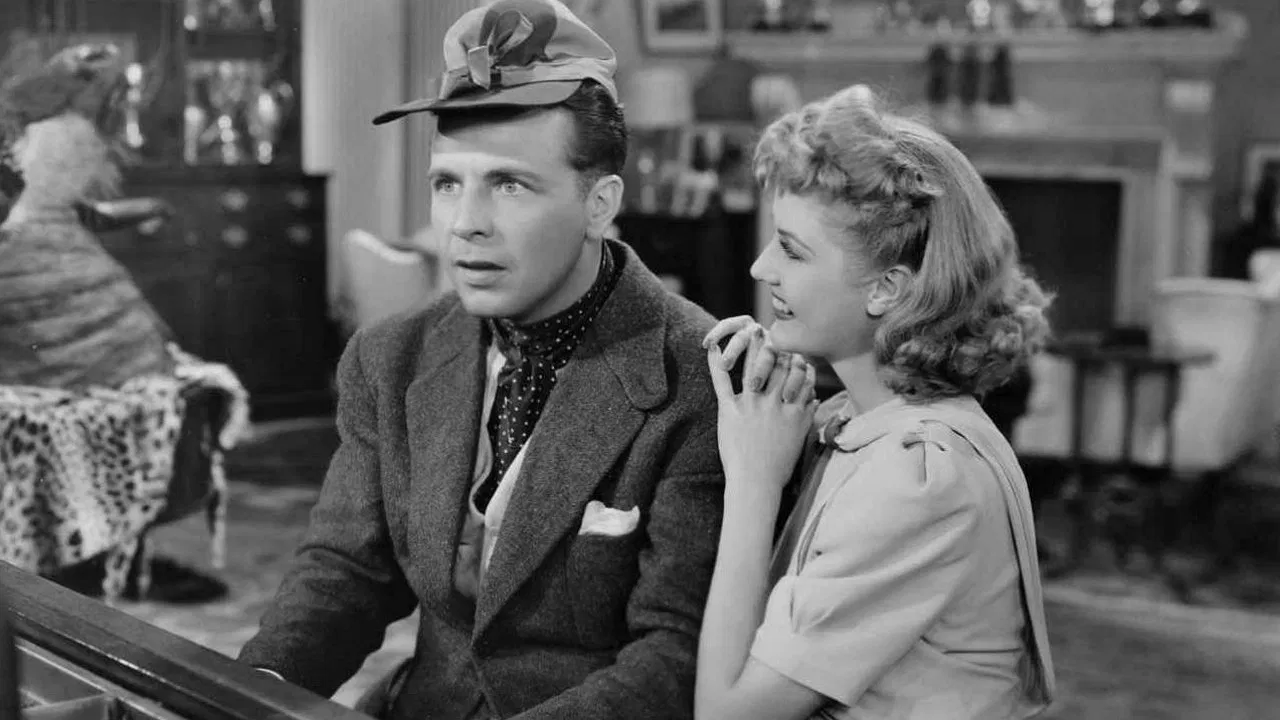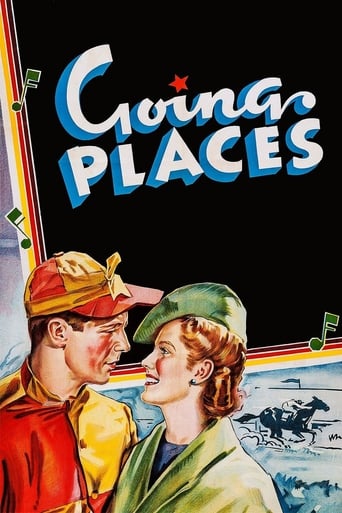

Sporting goods salesman Peter Mason (Dick Powell) is tired of getting customers that don't buy anything. He hatches an idea to advertise, and his co-worker thinks it'd be a bright idea for him to pose as Peter Randall, a famous jockey. He does so, but finds himself wrapped up in a scheme to win big by riding Jeepers Creepers, a strong but unruly horse. Anita Louise appears as the love interest, Ronald Reagan as the horse's owner, and Louis Armstrong as a stable hand who tames the horse with song. Nothing in this movie is really important; it is just something fun to watch to pass the time.The music is fun, especially the big dance number close to the end of the film. It seemingly has no place in the film, but it showcases Armstrong well. Powell carries the film along, but do not expect anything unusual in his performance. This is yet another musical that he was at this time tired of making.
... View MoreGOING PLACES is a slight comedy about horse racing that features a terrific cast of supporting players, many of them like Walter Catlett and Thurston Hall some of the best characters actors ever seen on screen. Powell, in his pre-hardboiled detective days, plays a store clerk who poses as a jockey for promotional reasons among the horse set in Maryland. Catlett is his co-worker who poses as his valet. Much identify confusion and merriment ensue, with several musical interludes, the most memorable being Mr. Louis "Satchmo" Armstrong debuting the classic number, JEEPERS CREEPERS, which in the movie is the name of a cantankerous race horse the horse-shy Powell ends up riding. This sort of film and in some cases the exact same plot had been done before and would be done again many times, with better known names like Bob Hope, Abbott and Costello and The Marx Brothers. Horse racing was at its most popular in the 1930s and '40s, only to quickly decline in the TV era. The highlight of the movie is an amusing musical number called "Charlie the Horse" sung in four-part harmony by Powell, Catlett and two silly thugs who are pushing the horse-hating Powell to race. It may remind some of something out of GUYS AND DOLLS.
... View MoreGoing Places was one of those films that made Dick Powell more determined than ever to get better parts or leave Warner Brothers. After one more film there, he did just that. Powell plays a sporting goods salesman in a department store and gets persuaded to impersonate a noted horseman and polo player who happens to be in Australia at the moment. Department store executive Walter Catlett is looking to market his wares among Maryland's horsey set and gets the bizarre notion to have Powell masquerade there. Catch is that just like in Cowboy from Brooklyn, Powell is deathly afraid of horses.I think you can see where the rest of this is going. It's in the tradition of race track comedies like A Day At the Races or It Ain't Hay. Of course those films were in the hands of comedians like the Marx Brothers and Abbott and Costello. Now Powell does look uncomfortable throughout and maybe his desperate wish not to be doing these kind of films translates into awkwardness. Powell was one of the most realistic at self assessment of his talents. He said himself he was not a national icon like Bing Crosby or creative like Fred Astaire. His days in musical films were numbered any way it was sliced. He had to break out or see his career go up the spout.But here in Going Places he wasn't even given anything good to sing. A few songs in the comic vein. The big hit number is Jeepers Creepers which sure was a big hit in 1938 and sung by the inimitable Louis Armstrong. Satchmo plays the groom of a horse named Jeepers Creepers who's one wild nag. Satch soothes the savage beast with his rendition of the song.Of course he endures some of the racial stereotyping of the day as well in the role. That could never have been to his liking, even to get a big song hit.Such Warner Brother veterans as Anita Louise, Allen Jenkins, Harold Huber and Ronald Reagan fill out the cast. Of his fellow contractees at Warner Brothers, Reagan for the rest of his life always singled out Pat O'Brien and Dick Powell as the most encouraging to a young player looking to rise.Only fans of the players named above should bother with this one.
... View MoreIt's easy to forgive the inane plot when the music and comedy are so much fun. First, there's the great Louis Armstrong singing and playing his trumpet in two songs, including the Oscar-nominated "Jeepers Creepers." He plays a horse groom, so what is he doing leading an all-black orchestra and a dozen or so black singers and dancers at a party? Never mind the incongruencies - just enjoy the big production number of "Mutiny in the Nursery." Louis is in good form in this early role. The comedy is mostly supplied by two masters of comedy, Allan Jenkins and Harold Huber, as likeable but inept crooks trying to eke out a living betting on horses. I was in stitches when they try to get Dick Powell to be a jockey in a race, and in desperation, Powell says he know nothing about horses (which is true) and writes songs (which is not). They insist he write a song then and there to convince them. While Powell and his boss, Walter Catlett, grope for words, they are the ones who supply most of the lyrics to "Oh, What a Horse Was Charlie." It's one of the funniest scenes you will see in a 1930's movie, all done verbally without slapstick. Then, of course, there is Powell, impersonating a famous jockey as an advertising ploy, falling in love with Anita Louise, and winding up riding a dangerous horse in the Maryland Steeplechase even though his riding experience is practically nil. The horse is called "Jeepers Creepers" and runs well only when he hears the song of the same name. Powell can't possibly win the race after running outside the course for a while and taking a spill on one of the hurdles. Or can he?
... View More